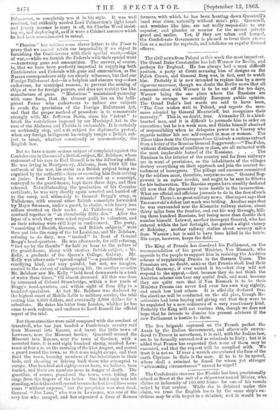The civil news from Poland is this week the most
important. The Grand Duke Constantine has left Warsaw for Berlin, and perhaps for England. He has always had a most difficult position, a party at Court accusing him of designs on the Polish Crown, and General Berg was, in fact, sent to watch him. Probably it is now intended to replace him by a more vigorous successor, though we doubt the Berlin news that all communication with Warsaw is to be cut off for ten days, Warsaw being the one place where the Russians are afraid to outrage too sensibly European public opinion. The Grand Duke's last words are said to have been, "The Czar wishes well to Poland, and regrets the mea- sures adopted by General Mouravieff, but recognizes their necessity." This is, no doubt, true. Alexander II. is a kind- hearted man, and it is difficult to persuade him to order an execution ; but he is a weak man, and thinks himself absolved of responsibility when he delegates power to a Viceroy who regards neither life nor self-respect in man or woman. The Times takes from the Correspondanee Ginerale a curious extract from a letter of the Russian General Boggawout:—" The Poles, without distinction of condition or class, are all animated with the most implacable hatred of the Russians. . . . The Russians in the interior of the country and far from railways are in want of provisions, as the inhabitants of the villages destroy everything on their approach and join the nearest de- tachment of insurgents. The pillage and excesses committed by the soldiers must, therefore, surprise no one." General Bog- gawout is an. enfant terrible, and ought to be sent to Siberia for his indiscretion. The Russian organs have steadily declared till now that the peasantry were hostile to the insurrection. What are official and officious journals to do in the face of such friends? There is no great military news. One report says that Taczanowski's defeat last week was trifling. Another says that he was surrounded near the Klomnitz railway station, about thirty miles from the frontier, and cut his way through, kill- ing three hundred Russians, but losing more than double that number himself. Lelewel, another insurgent General, who has entered within the last fortnight, has gained a slight victory at Rokiciny, another railway station about seventy miles from Warsaw ; but is said to have been killed in the battle. His corps, however, keeps the field.


































 Previous page
Previous page